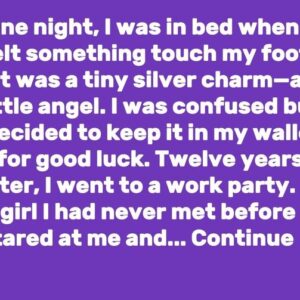My husband, Owen, and I welcomed our baby boy into the world last week. It was a long, grueling process, but I was determined to have a natural birth. Owen was by my side the entire time, holding my hand and offering support. However, as the labor intensified, so did my screams of pain.
Each time I screamed, Owen leaned in close and whispered, “Can you stop screaming? You’re really embarrassing me.” His words cut through the fog of my pain, leaving me feeling both furious and hurt. He repeated his plea several times, each one stinging more than the last.
After our son was finally born and we were both resting in the hospital room, I couldn’t shake the anger I felt toward Owen. I decided that once we got home, I would teach him a lesson about the sacrifices and pain women endure during childbirth.
When we finally arrived home with our baby boy, I was still fuming. As we settled in, Owen’s behavior continued to baffle me. Instead of showing remorse or offering an apology, he seemed distant and preoccupied. I decided to confront him directly.
“Owen, we need to talk,” I said, trying to keep my voice steady despite the anger simmering beneath the surface.
He looked up from where he was setting up the baby’s crib. “What is it?”
“I can’t believe you had the nerve to tell me to stop screaming during labor. Do you have any idea how much pain I was in?” My voice cracked with emotion.
Owen sighed and ran a hand through his hair. “It is a woman’s job to be strong and composed,” he said, his tone surprisingly calm. “I just wanted you to be strong for our son.”
His words left me stunned. “A woman’s job?” I repeated, incredulous. “Do you even hear yourself, Owen? Do you have any idea what childbirth is like?”
He looked at me, finally showing a hint of vulnerability. “I didn’t know how to handle seeing you in so much pain. It scared me, and I felt helpless. I thought if you could stay calm, it would make everything better.”
Tears welled up in my eyes, not from anger but from a deep sadness. “Owen, childbirth isn’t something you can control with composure. It’s raw, painful, and powerful. I needed your support, not your criticism.”
Owen’s shoulders sagged, and he came over to sit beside me. “I’m sorry,” he said quietly. “I was wrong. I was so focused on my own feelings that I didn’t consider yours. I promise I’ll do better.”
I took a deep breath, feeling the tension slowly start to release. “I need you to understand that my pain and my emotions during labor were valid. I need you to be there for me, not just physically, but emotionally too.”
Owen nodded, his eyes filled with regret. “I understand. I’ll make it up to you, I swear.”
As we sat there together, our newborn son sleeping peacefully in his crib, I realized that this was just the beginning of a new chapter in our lives. There would be challenges, misunderstandings, and moments of hurt, but there would also be love, growth, and learning.
We spent the next few days adjusting to our new roles as parents. Owen made a conscious effort to be more understanding and supportive, and I saw a genuine change in his attitude. He became more involved, not just in caring for our son but also in supporting me as I recovered from childbirth.
One evening, as we sat together, Owen turned to me and said, “I’ve been reading about childbirth and postpartum care. I had no idea how much women go through. I’m so sorry for how I acted. You’re incredibly strong, and I’m so proud of you.”
His words brought tears to my eyes again, but this time, they were tears of relief and gratitude. “Thank you, Owen. That means a lot to me.”
Our journey as new parents was just beginning, but I felt hopeful. We were learning together, growing together, and through it all, we had each other. And as I looked at our sleeping baby, I knew that the love we shared would guide us through any challenges that lay ahead.


